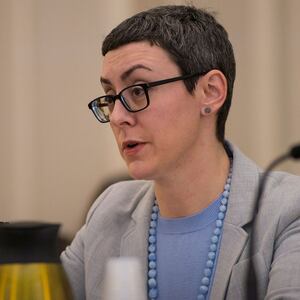The allegations made by Evelyn Yang, the wife of Democratic presidential candidate Andrew Yang, and multiple other women against New York City doctor Robert Hadden raise troubling questions about how white-collar sexual assault defendants like him, Harvey Weinstein and Jeffrey Epstein have appeared to receive favorable treatment at the expense of their victims from Manhattan District Attorney Cyrus Vance.
Vance's office had an overwhelming case against the ob/gyn doctor, after 18 of his patients came forward with remarkably similar stories of being sexually assaulted by Hadden under the pretense of his doing medical examinations. Yang testified in a grand jury and was assured by a prosecutor that the case was a strong one. Why then was the end result a plea bargain to a single felony count and no jail time?
As a former sex crimes prosecutor, I often encountered an inherent bias among law enforcement and prosecutors that favored more lenient treatment of “white-collar” defendants charged with sex crimes. Sometimes, that was due to wealthier clients getting more attention because their high-priced lawyers demanded it from the prosecutors. Vance’s office already faced criticism for its initial reluctance to prosecute Harvey Weinstein—even conducting its own “oppo research” on one of his accusers—and its attempt to seek a lower sex-offender registration status for Epstein (which Vance later said was a mistake by an unauthorized assistant district attorney).
ADVERTISEMENT
Notably, in Weinstein’s case his defense team included not only David Boies —who had a history of donating to Vance’s campaigns—but also Linda Fairstein, the former head of the Sex Crimes section in Vance’s office. Similarly, Hadden’s defense lawyer, Isabelle Kirshner, made donations to Vance’s campaign, including one donation made on the same day that she filed a motion in Hadden’s case.
Often, as in Hadden’s case, defense lawyers make the argument that such alternatives as professional discipline should be considered punishment enough for defendants like medical doctors. That seems to be exactly what Vance’s office did here as Hadden was required to surrender his medical license as part of his plea bargain. But this amounts to a kind of alternative-dispute resolution that prosecutors need to stay away from because it arises from the attitude that professionally skilled defendants have more to lose than non-professionals. That’s the wrong focus.
The focus needs to be on survivors, not defendants. To a survivor of sexual assault, it doesn’t matter whether their attacker has a medical degree or not. The right focus should be on justice for the survivor and making sure the predator doesn’t repeat his modus operandi with other victims.
The actions of the prosecutors in the Hadden case painfully illustrate the poor treatment of victims of crime. Despite some legislative efforts to ensure that crime victims get a voice in prosecution decisions, communication is often poor with them. Yang’s recounting of her communication with the DA’s office reflects how it failed to take into account her views even after she had the courage to come forward and testify in the grand jury. The excuses given by Vance’s office include claiming the punishment would have been the same no matter which counts Hadden was convicted of, and also apparently excluding victims from being heard at sentencing unless they were the victims of one of the counts to which Hadden had pled guilty. These are unconscionably wrong rationalizations.
The idea that the punishment remains the same no matter how many convictions occur is absurd. Prosecutors are free to ask for consecutive sentences from a judge and, although judges often favor concurrent sentences, a case such as Hadden or Bill Cosby frequently results in consecutive sentences.
Similarly, excluding victims from speaking at sentencing, whether through a written victim impact statement or directly addressing the court, simply because they were not the victims in the charged crime is also wrong. At sentencing, unlike at trial, judges have broad latitude over what evidence they consider. When I successfully prosecuted and secured the first life-without-parole sentence for a serial rapist in Washington, D.C., my trial partner and I introduced numerous statements from other victims which were critical to giving the judge the full picture of the danger the defendant posed to society if he were ever allowed to go free again.
The failings of Vance’s office in the prosecution of the doctor don’t impact just his victims. They hurt the overall effectiveness of our criminal justice system and put unknown numbers of future potential victims of other predators at risk. After Yang’s brave public criticisms, Vance’s office issued a statement that claimed they stood by their ‘legal analysis.” But legal analysis wasn’t the problem. The legal analysis would have dictated that Hadden spend years in prison. The problem was the favoritism enjoyed by wealthy professionals accused of sex crimes.






